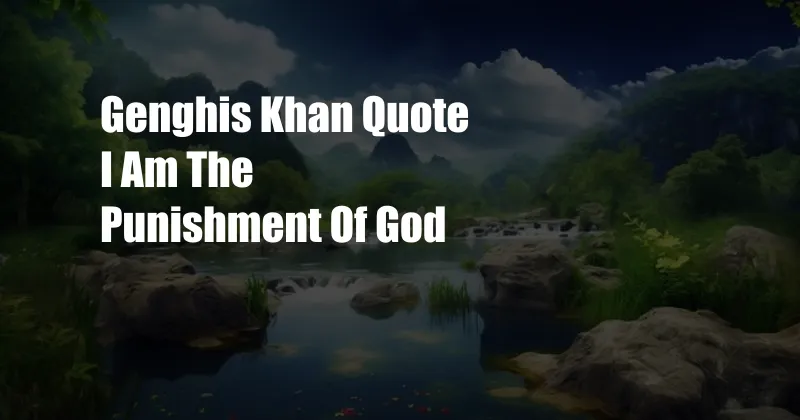
**I Am the Punishment of God**
Have you ever wondered about the infamous quote attributed to Genghis Khan, “I am the punishment of God”? What does it mean, and what was the context behind it? In this article, we embark on a historical journey to explore the origins and implications of this chilling proclamation.
The legend of Genghis Khan is steeped in both awe and terror. As the founder of the Mongol Empire, he orchestrated an unprecedented wave of conquest that reshaped the world map. His military acumen and ruthless tactics earned him a reputation as a formidable warrior and a cunning strategist.
**The Divine Mission of Genghis Khan**
To understand the quote, we must delve into the Mongol belief system. Mongols revered the Eternal Blue Sky as their supreme deity, and they believed that the Khan was a direct descendant of the Sky God. As such, Genghis Khan saw himself as an instrument of divine will, sent to punish those who defied the Sky God’s laws.
In a letter to the Sultan of Khwarezm, Genghis Khan wrote, “You have transgressed the laws of God, and I am the punishment of God. If you do not submit and repent, I will destroy you and your people.” This message reflected his belief in his divine mission to punish those who defied the Mongol Empire and its laws, which he believed were ordained by the Sky God.
**A Historical Context**
The quote, “I am the punishment of God,” is widely believed to have been uttered by Genghis Khan during his siege of Bukhara in Central Asia in 1220. The city had resisted the Mongol invasion, and Khan’s forces retaliated with brutal force, massacring tens of thousands of people.
The statement was a chilling reminder of Khan’s belief in his divine mission. He saw himself as the executioner of God’s wrath, and he believed that those who opposed him were destined for punishment. This mindset fueled his relentless campaign of conquest, as he sought to establish a Mongol Empire that would spread from the Pacific Ocean to the Mediterranean Sea.
**Interpretations and Implications**
The quote, “I am the punishment of God,” has been interpreted in various ways throughout history. Some scholars argue that it was a clever propaganda tactic used by Genghis Khan to justify his conquests and instill fear in his enemies.
Others believe that Khan genuinely believed in his divine mission, and that the quote reflected his zeal for carrying out God’s will. The true meaning of Genghis Khan’s words may always remain elusive, but they undoubtedly left a lasting impact on the world.
**Modern Resonances**
Even today, the quote, “I am the punishment of God,” evokes a sense of awe and terror. It is a potent reminder of the destructive power that can be wielded by those who claim to act in the name of God.
The quote has been invoked by countless leaders and demagogues throughout history to justify violence and oppression. It is a sobering reminder that religious extremism and fanaticism can lead to untold suffering.
**Tips for Further Exploration**
- **Read firsthand accounts of Genghis Khan’s life and conquests, such as The Secret History of the Mongols.**
- **Explore the religious beliefs and mythology of the Mongols to better understand the context of Khan’s quote.**
- **Examine the historical impact of Genghis Khan’s conquests and the legacy of his empire.**
- **Consider the relevance of Khan’s quote to contemporary issues of religious extremism and terrorism.
Note: The information provided in this article is intended for educational purposes only. The views expressed are those of the author and do not necessarily reflect the opinions of any organization or institution.
**Frequently Asked Questions**
- Who was Genghis Khan?
- What is the meaning of the quote, “I am the punishment of God”?
- When did Genghis Khan say this quote?
- What is the historical context of the quote?
- What is the relevance of this quote to modern times?
Genghis Khan was the founder and first Great Khan of the Mongol Empire, the largest contiguous land empire in history.
Genghis Khan believed that he was a direct descendant of the Sky God, the supreme deity of the Mongols. He saw his conquests as a divine mission to punish those who defied the Sky God’s laws.
The quote is widely believed to have been uttered by Genghis Khan during his siege of Bukhara in 1220.
The city of Bukhara had resisted the Mongol invasion, and Khan’s forces retaliated with brutal force, massacring tens of thousands of people. The statement was a chilling reminder of Khan’s belief in his divine mission to punish those who opposed him.
The quote remains a potent reminder of the destructive power that can be wielded by those who claim to act in the name of God. It has been invoked by countless leaders and demagogues throughout history to justify violence and oppression.
**Conclusion**
Genghis Khan’s quote, “I am the punishment of God,” is a complex and controversial statement that has fascinated and horrified historians for centuries. Whether it was a clever propaganda tactic or a genuine expression of his religious beliefs, the quote remains a chilling reminder of the destructive power of religious extremism and the importance of tolerance and understanding.
Are you interested in learning more about Genghis Khan and the fascinating history of the Mongol Empire? If so, I encourage you to explore the resources listed above.